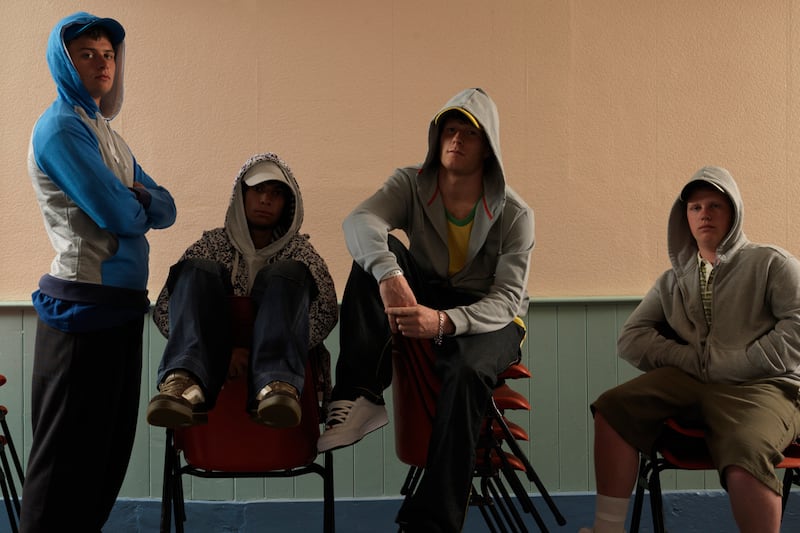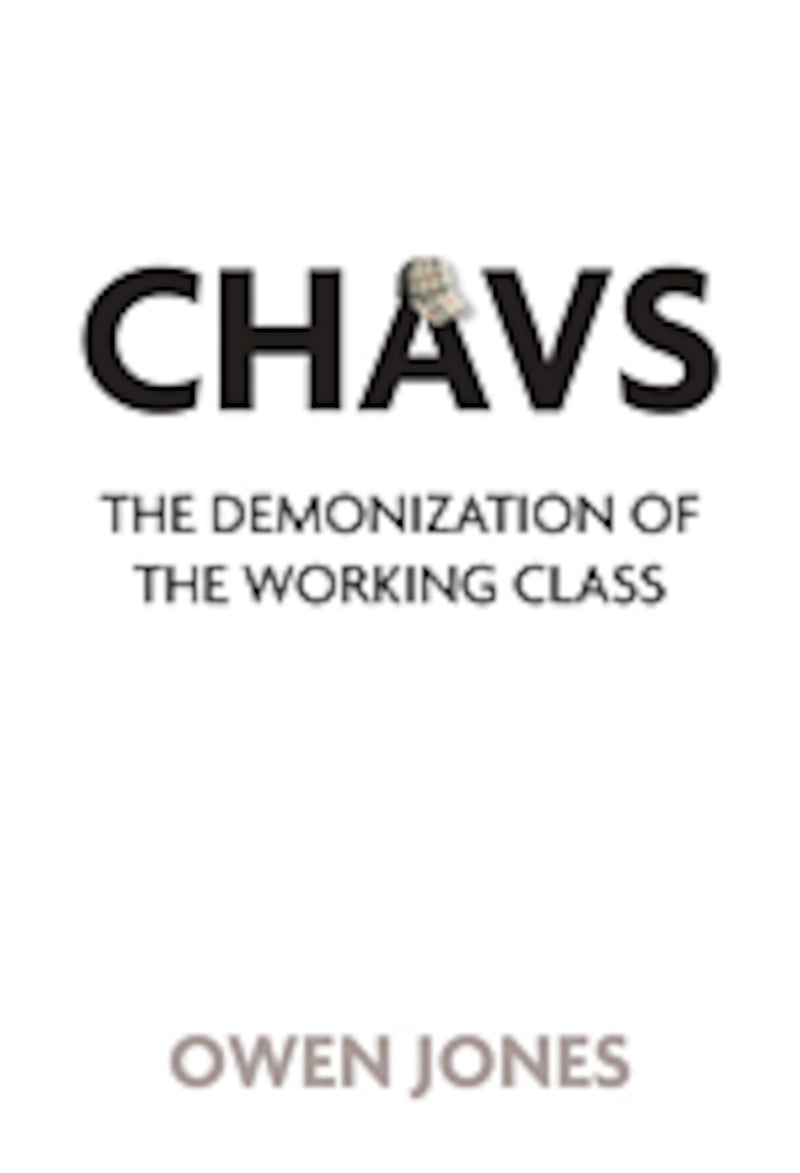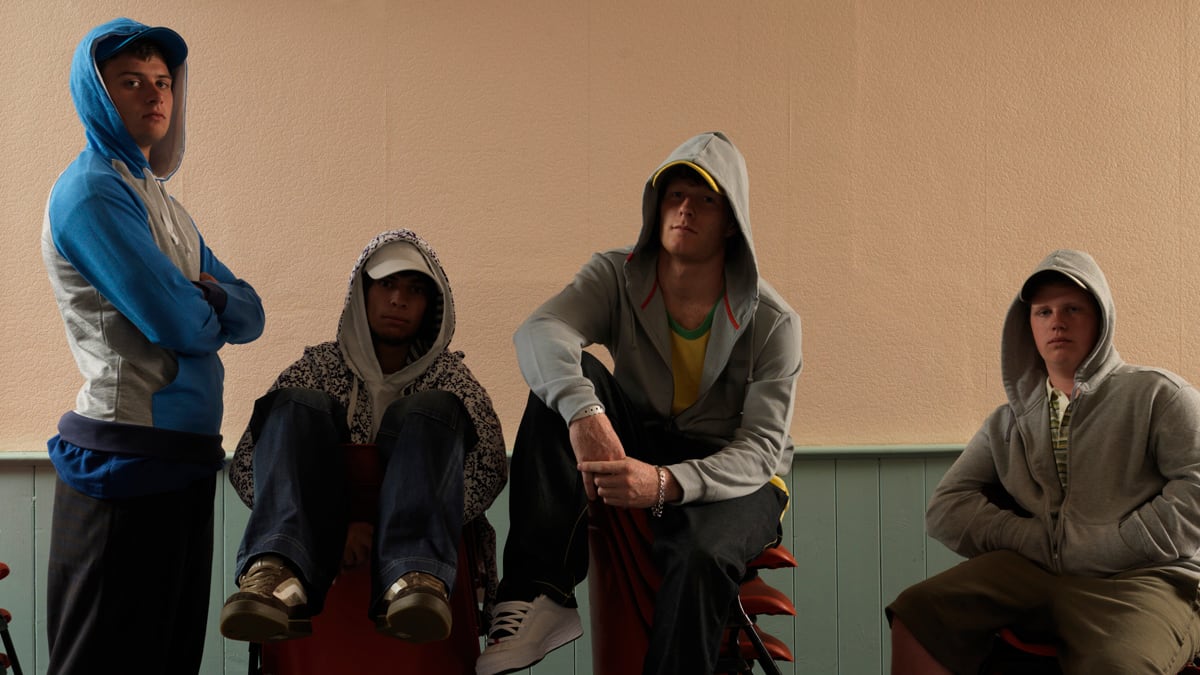What word begins with C, contains four letters, and is one of the most provocative and insulting in the English language? Let me help you out: It’s probably not what you’re thinking. Or at least according to a new book by the left-wing British writer Owen Jones it’s not. By his account, the word “chav”—C-H-A-V—is symptomatic of a grim social and political sickness in modern Britain. It is a word that stereotypes and sterilizes, and that, in its way, breaks lives as surely as sticks and stones could. It is an insult in bold type, writ large.
But what does it mean? I’m unsure how much of our delightful British cant makes it across the Atlantic, so I shall assume that the word “chav” isn’t flung around your living rooms, offices, and debating halls. It is thought to have derived from the Romany word for a youth, chavi, and has retained some of that meaning in its abbreviated form. But we aren’t talking about carefree, rose-cheeked youths here. As the caricature would have it, chavs are poor, criminal, selfish, stupid, oversexed, tasteless, work-shy wasters who parade the streets dressed in expensive sports clothing and loaded with cheap alcohol and knives. If you are mocked as a “chav,” then the implication is that you embody one, or more, of these qualities.

Which would be fine, one might argue, if the chav label were reserved for nasty people. But it isn’t, says Jones. As the subtitle of his Chavs: The Demonization of the Working Class implies, he thinks that “chav” has become a byword for Britain’s laboring class, and is revealing of our wider attitudes to the least well off in society. “Oh, you’re so chavvy,” we say, when what we actually mean is, “You’re dressed like a poor person.” It has become an acceptable form of slander, akin to describing every disadvantaged American as “trailer trash.”
Or has it? Much of the fierce debate over Jones’ book has settled on the meaning of the word “chav” and its bounds. The nation recalls the garish, hyperexpensive wedding of David and Victoria Beckham as “chavvy” —so it can’t just be about poor people, right? Or as my Spectator colleague Rod Liddle put it in his review of the book, “An affection for tanning salons, tattoos and tight white jeans, together with pride in never having read a book, are more indicative of chavdom than a lower-than-average income.”
While there is some truth in that, to focus on definitions does a discredit to Jones’ wider analysis of the working class and its plight. Britain, it is clear, is a country pockmarked by deprivation and want. That the same can be said of other developed nations makes the facts no less shocking. There are, for example, housing estates in Glasgow where life expectancy is lower than in Bangladesh. People in the richest areas of our cities can, on average, live for decades longer than those in the poorest. Everything from educational outcomes to employment levels can slump alarmingly as you move from Britain’s easy streets to its death rows. It is a situation worth getting angry about.
And so Jones does get angry. An insistent sort of rage propels his text forward and keens its edges, turning dry numbers into pointed weapons. Yet there are moments when it becomes too much, damaging only his argument. As someone firmly on the left of Britain’s political spectrum, Jones has scant regard for anyone to his right, from most of the current Labour Party to, unsurprisingly, the Conservatives in government. It does push him toward drawing a caricature of his own, one of slathering, bloodsucking right-wingers.

Take one passage where he sneers at the privileged Conservative leader David Cameron for, I quote, “describing his wife’s upbringing as ‘highly unconventional'—because ‘she went to a day school.’” Here’s what Cameron actually said:
“I was lucky in that Samantha—as much as the papers keep writing that she comes from a very blueblooded background—is actually very unconventional and is hard to put in a box. She went to a day school, was a Goth at 14, had quite a wild childhood, is unconventional and challenging, and that is very good, as it stopped me from being too straight down the line.”
Not quite the same, is it? And some of the book’s facts and figures are similarly skewed. The go-to number crunchers at London’s Institute for Fiscal Studies may, for instance, quibble with Jones’ settled wisdom that raising the rate of value-added tax (our general sales tax) “hits those on low incomes the hardest.” Likewise, Jones quotes a newspaper interview with a Swedish education minister to illustrate his claim that the British government’s Free Schools policy has been “tried in Sweden where it failed with disastrous consequence.” What he doesn’t mention is what the Swedish minister has since said of that interview:
“The article is very biased. It is taken out of context and misleading. I have not warned the British Government against introducing Free Schools. As for the Swedish Free Schools, I clearly said to the newspaper that the Swedish Free Schools are here to stay and that it is something positive.”
But I’m reluctant to dwell on particulars, not least because the power of Jones’ book lies in its general case, shorn of party political specifics. Look at those life-expectancy facts again. There are many more examples of the divide between rich and poor that we could pile on top of them. How about the fact that our deputy prime minister’s old school sends twice as many pupils to Oxford or Cambridge each year as emerge from the tens of thousands of pupils poor enough to qualify for “Free School Meals”? Or that only 2 percent of our judges were educated at state comprehensive schools, and 14 percent of our journalists? The idea of “meritocracy” has been hard-wired into British politics for decades now, the economy has grown outward in all sorts of ways—and yet still, this is the outcome. Waves of deindustrialisation and a dysfunctional welfare state have left their mark.
In the end, we take from these books what we will. And, for me, Chavs is a fiery reminder of how the system has failed the poor. We might scoff, mock, and stereotype, but that’s not going to do anything about life expectancy in Glasgow or literacy rates in a former mining community. Sometimes a dose of indignation is just what we need.






